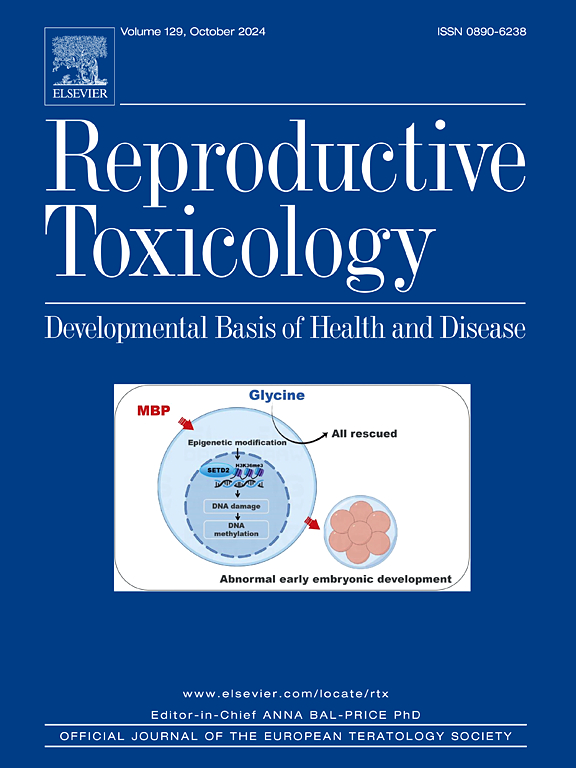卡马西平暴露对亲代(F0)和F1代大鼠附睾精子的影响
IF 2.8
4区 医学
Q2 REPRODUCTIVE BIOLOGY
引用次数: 0
摘要
卡马西平(CBZ)是一种用于神经和精神疾病治疗的药物。它对男性生殖的潜在副作用令人担忧。在CBZ长期治疗期间和之后,精子参数和性激素水平发生了变化。然而,精子质量的改变不一定与生育能力的下降有关,而且可能对后代产生潜在的不利影响。本研究旨在评价cbz处理的成年大鼠从青春期前到成年期(F0代)附睾精子的定性和定量参数及其对其后代(F1代)精子的潜在影响。雄性大鼠从青春期前(出生后23天)至成年期(出生后95天)灌胃CBZ(20 mg/Kg/天)。对照组按相同的实验程序给予橄榄油(对照品)。在95pnd时,分析F0和F1代精子的定性和定量参数。测量睾丸和附睾丙二醛水平和血浆睾酮水平。父亲慢性CBZ暴露(F0代)降低了精子活力和活力,增加了DNA断裂,改变了线粒体活性和顶体完整性。睾丸激素水平、睾丸第19步精细胞和每日精子产量也有所下降。观察到睾丸和附睾氧化应激显著增加。这些改变也发生在F1代。结果表明,父亲长期接触CBZ可引起精子质和量的改变,睾酮水平降低,影响后代雄性生殖健康。本文章由计算机程序翻译,如有差异,请以英文原文为准。
Effects of carbamazepine-exposure on rat epididymal sperm in parental (F0) and F1 generations
Carbamazepine (CBZ) is a medication used for neurological and psychiatric disorders treatment. Its potential side effects on male reproduction are a cause for concern. Alterations in sperm parameters and sex hormone levels have been reported during and after prolonged therapy with CBZ. However, alterations in sperm quality are not necessarily associated with a decrease in fertility, and may potentially lead to adverse effects on the offspring. The study aimed to evaluate the qualitative and quantitative parameters of epididymal sperm in CBZ-treated adult rats from pre-puberty to adulthood (F0 generation) and their potential impact on the spermatozoa of their offspring (F1 generation). Male rats were treated with CBZ (20 mg/Kg/day), administered by gavage, from pre-puberty (23 postnatal days - pnd) until adulthood (95pnd). The control group received olive oil (vehicle) following the same experimental procedure. At 95pnd, sperm qualitative and quantitative parameters were analyzed in the F0 and F1 generations. Measurements of testicular and epididymal malondialdehyde levels and plasma testosterone levels were also performed. Paternal chronic CBZ exposure (F0 generation) reduced sperm motility and viability, increased DNA fragmentation, and altered mitochondrial activity and acrosome integrity. Testosterone levels, testicular step 19 spermatid and daily sperm production also decreased. Significant increases in oxidative stress in the testis and epididymis were observed. These alterations also occurred in the F1 generation. The results suggest that prolonged paternal exposure to CBZ can cause sperm qualitative and quantitative alterations, decrease in testosterone levels, affecting intergenerationally the male reproductive health of offspring.
求助全文
通过发布文献求助,成功后即可免费获取论文全文。
去求助
来源期刊

Reproductive toxicology
生物-毒理学
CiteScore
6.50
自引率
3.00%
发文量
131
审稿时长
45 days
期刊介绍:
Drawing from a large number of disciplines, Reproductive Toxicology publishes timely, original research on the influence of chemical and physical agents on reproduction. Written by and for obstetricians, pediatricians, embryologists, teratologists, geneticists, toxicologists, andrologists, and others interested in detecting potential reproductive hazards, the journal is a forum for communication among researchers and practitioners. Articles focus on the application of in vitro, animal and clinical research to the practice of clinical medicine.
All aspects of reproduction are within the scope of Reproductive Toxicology, including the formation and maturation of male and female gametes, sexual function, the events surrounding the fusion of gametes and the development of the fertilized ovum, nourishment and transport of the conceptus within the genital tract, implantation, embryogenesis, intrauterine growth, placentation and placental function, parturition, lactation and neonatal survival. Adverse reproductive effects in males will be considered as significant as adverse effects occurring in females. To provide a balanced presentation of approaches, equal emphasis will be given to clinical and animal or in vitro work. Typical end points that will be studied by contributors include infertility, sexual dysfunction, spontaneous abortion, malformations, abnormal histogenesis, stillbirth, intrauterine growth retardation, prematurity, behavioral abnormalities, and perinatal mortality.
 求助内容:
求助内容: 应助结果提醒方式:
应助结果提醒方式:


